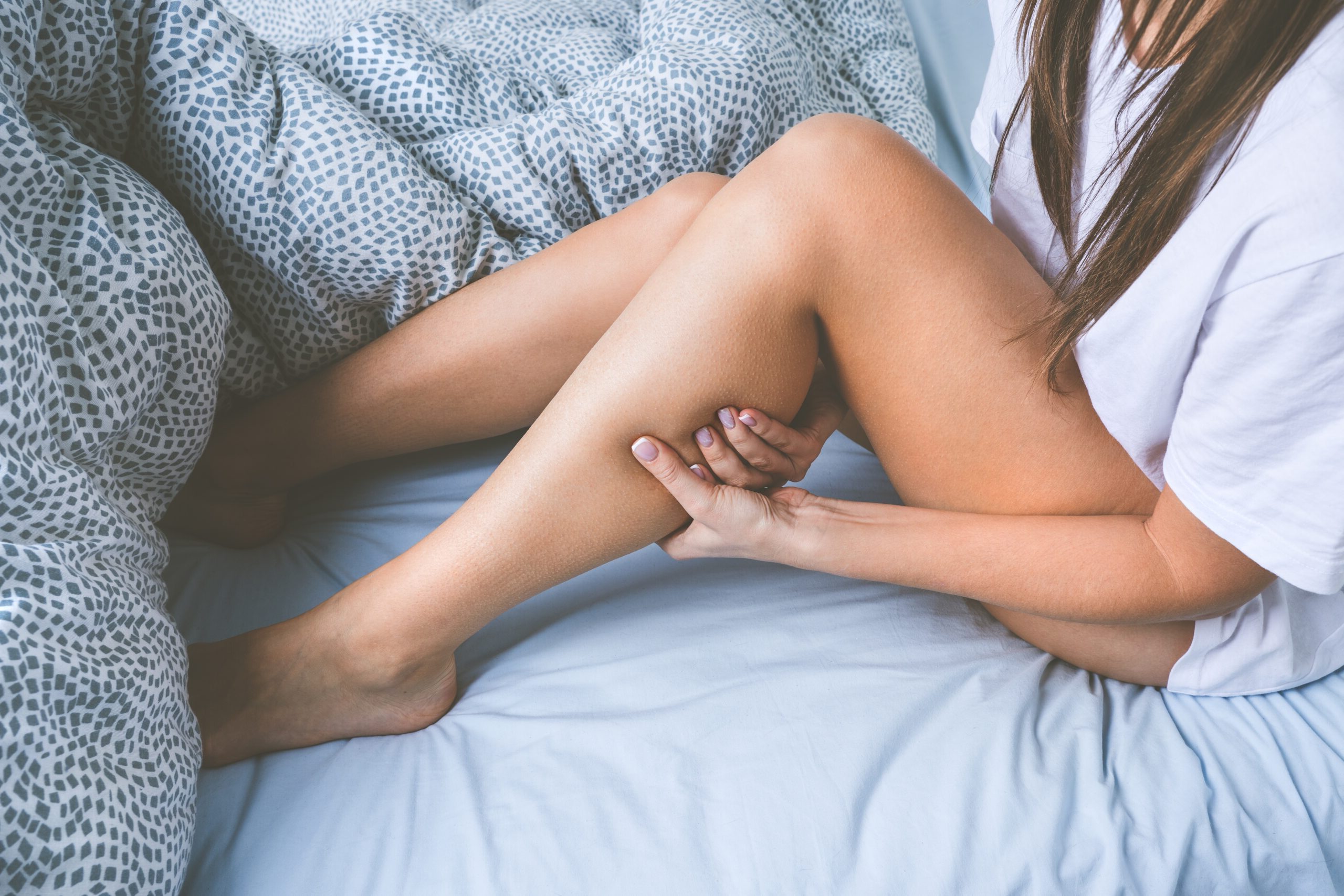Don’t Let Leg Cramps at Night Keep You Up
Leg cramps at night can occur at any age, but they are most common among older adults, women, pregnant women, dehydrated individuals, and those with certain medical conditions such as nerve damage and muscle fatigue.
The most common cause of bad calf cramps at night is aging. Nearly every adult over age 50 experiences a leg cramp at least once every two months, and one-third of people over 60 will suffer one every two months.
Night leg cramps can be caused by a variety of factors, but there is no one definitive cause.
Dehydration and Leg Cramps at Night
Leg cramps at night are almost guaranteed as a result of dehydration. The muscles may be more susceptible to cramping as a result. Dehydration can also cause an imbalance in sodium levels in the blood, which can also cause muscle cramps.
During dehydration, your body pulls water from your muscles. The muscles can become more susceptible to cramping as a result. Dehydration can also cause electrolyte imbalances.
In order for muscles to function properly, electrolytes such as potassium and magnesium are needed. Muscle cramps while sleeping can occur when these electrolytes are out of balance.
Blood can also become thicker when dehydrated. Bad calf cramps at night can also occur as a result of this reduced blood flow to the muscles. It is important to stay hydrated if you are experiencing night leg cramps, and you should also stay hydrated throughout the day, especially with water. Coconut water or sports drinks may help replace the electrolytes your body needs.
The Enigma Behind Low Levels of Electrolytes
An electrolyte is a mineral that conducts electricity — and its function and level is highly correlated to leg cramps at night. In addition to contraction and relaxation of muscles, they perform a variety of other functions in the body. It is possible to get muscle cramps when electrolytes are low in the body.
An electrolyte’s role in muscle function can be summarized as follows:
- The movement of fluids in and out of cells is regulated by potassium. Muscle contraction and relaxation can also be controlled by it.
- Muscle contraction and relaxation are also facilitated by magnesium. As well as regulating nerve function, it also helps to improve blood flow.
- In order for muscles to contract, calcium is necessary. As well as strengthening the bones, it helps to keep muscles healthy.
As you can see, muscles may be unable to contract and relax properly if electrolytes levels in the body are low, with cramping resulting. In this case, treatment for nighttime leg cramps should be explored. Muscles can also be more sensitive to pain when electrolytes are low. Cramping can become more painful as a result.
Muscle fatigue can also be caused by low electrolyte levels and may result in muscle cramps while sleeping.
Leg Cramps at Night from Nerve Damage
Nerve damage that interferes with signals sent to your muscles can cause leg cramps at night. Because they’re damaged, they cannot send the correct signals.
Nerve damage can prevent nerves from sending the signal to relax muscles. Muscles can contract involuntarily due to this, resulting in cramps. Muscles can also become more sensitive to pain when they suffer nerve damage. Intense cramps can result from this.
Nerve damage can also cause chronic muscle fatigue. Consequently, bad calf cramps at night are more likely to occur.
Even worse: Diabetes, peripheral artery disease (PAD), spinal stenosis, and sciatica are some of the conditions that can cause nerve damage and leg cramps at night. Cramping can result from diabetes damage to the nerves in the feet and legs. As a result of PAD, the arteries in the legs narrow, which in turn reduces blood flow to the muscles and causes cramps. Spinal Stenosis (When the spinal canal narrows) can compress nerves. This effect can also lead to cramps.
We wouldn’t be complete if we didn’t mention sciatica. It causes pain that radiates down the leg from the lower back, caused by pressure on the sciatic nerve, which can also cause cramping.
A Deeper Analysis of Muscle Fatigue and Cramping
Muscle fatigue can cause leg cramps at night. This makes the muscles more prone to a slew of other conditions. And unfortunately, they can last all night, in the worst of cases. Fatigue also makes muscles less able to contract and relax. There is a possibility this will result in a muscle cramp as well.
In fact, muscle fatigue increases your chances of experiencing tightness or cramping. Nerve pressure can cause bad calf cramps at night.
Muscle fatigue also increases the likelihood of knotting and muscle cramps while sleeping. It’s also possible for these knots to exert pressure on the nerves, resulting in cramps. As a result of fatigue, muscles are less likely to relax as easily when stretched.
Stretching the Muscle for Leg Cramps at Night
Stretching can often prevent leg cramps at night. As a result of stretching, the muscles loosen up and become more flexible, which prevents them from becoming tight or cramping. However, that’s not the entire story.
Stretching muscles can also worsen muscle cramps. In this case, stretching can make it more difficult for the muscle to relax, due to its already contracted state. The best thing you can do if you have a leg cramp is to relax your muscles. You can use a gentle massage or heat to relax the affected muscle. If the muscle is not too painful, you can stretch it.
You should consider exploring treatment for nighttime leg cramps if the cramp is severe or does not go away after a few minutes. Having cramps could be a sign of an underlying medical condition.
Nonetheless, the following tips will help you prevent bad calf cramps at night:
- Make sure you stay hydrated. Drink plenty of fluids throughout the day, especially water. Dehydration can cause muscle cramps.
- Make sure you eat a balanced diet. Eat a balanced diet that includes fruits, vegetables, and whole grains. Electrolytes are important for muscle function, so these foods are good sources.
- Regularly stretch your legs. It’s beneficial to stretch the muscles in order to loosen them and make them more flexible. Doing this can prevent muscle cramps.
- Don’t sit or stand for long periods of time. Leg muscles can become cramped after sitting or standing for a long time.
- Make sure you wear comfortable shoes. A tight pair of shoes can cause cramps in your legs, as they tend to put pressure on the muscles.
Try These Too!
In addition to these above remedies for muscle cramps while sleeping, you can also try:
- Not drinking alcohol and caffeine before bed. These substances can cause dehydration and cramping.
- Gently stretching the muscle. You can also apply heat or gently massage the muscle.
Talk to a Specialist About Leg Cramps at Night
Talk to your doctor about ways to reduce your risk of leg cramps at night — especially if you’re taking medications that can cause them. You may experience leg cramps if you are taking certain medications, such as diuretics or statins.
Underlying medical conditions, such as vessel insufficiency, may be the cause of your cramps. This is especially true if you suffer from frequent or severe leg cramps. An expert in pain management usually only needs a brief consultation and diagnosis before performing vessel ablation, sclerotherapy, or another minimally invasive procedure.
The best course of action is to see your doctor if you suffer from bad calf cramps at night on a regular basis or if they become severe enough to make walking or standing difficult. Your doctor will most likely ask questions about your medical history, medications, and recent changes in your activity level. As well as asking about your diet, they might also ask how much fluid you consume daily.
Seek emergency medical attention if a leg cramp lasts more than 10 minutes or is unbearably painful. Additionally, it could be poisonous or infectious if the cramping occurs after touching substances. Leg cramps are usually not a cause for concern and occur occasionally. Exercise or long periods of sitting may cause them. Pregnancy and aging may also increase them.
Gentle stretching and massaging of the muscle can relieve the pain from muscle cramps while sleeping. You should consult a doctor if you experience leg cramps regularly or if the cramp lasts for a long time. You shouldn’t hesitate to seek treatment for nighttime leg cramps. The condition could be a sign of an underlying health condition.
Wellness and Pain Can Help
A range of options for treating leg cramps at night are available at Wellness and Pain. We offer conservative treatments, routine visits, and minimally invasive quick-recovery procedures. We can keep you free of problems by providing lifestyle education and home care advice to help you avoid and manage issues, quickly relieving the inhibiting lifestyle conditions when complications arise.
At Wellness and Pain, we personalize patient care plans based on each patient’s condition and unique circumstances to relieve pain, improve mobility and mental space, and improve your overall health.
Keep reading to learn more of what you can do about leg cramps and charley horses.











